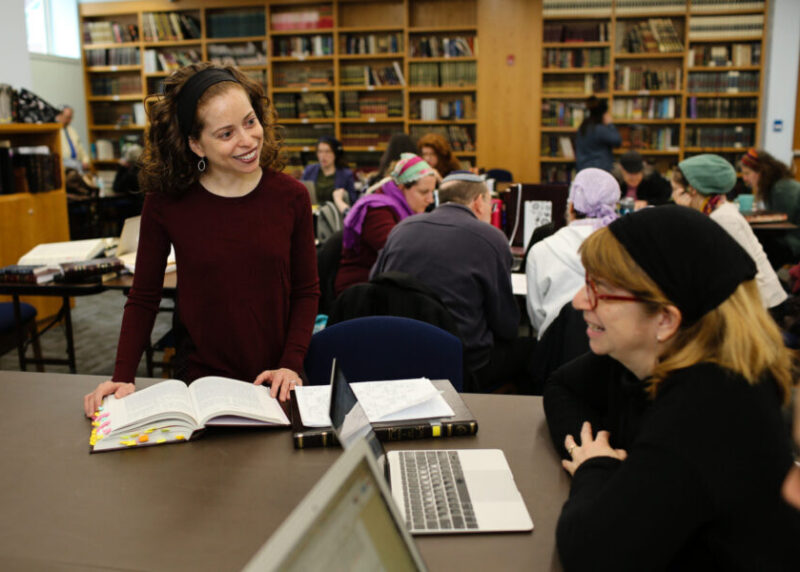Opinion
Gemara for all
Making Talmud study for women the norm, not the exception
In Short
Torah study for women has come a long way in recent years, but recent events show it is still in a precarious position
The other day, I was speaking to a group of Orthodox women from a more right-wing community, who have had very little exposure to learning Gemara. They too are ready to step into the world of women’s learning, expressing a hunger to understand why they were following Jewish law. As I was listening to their desire to access Jewish text, I was overwhelmed by how extraordinary and groundbreaking it is that I have had so many wonderful opportunities to study Talmud as a Modern Orthodox woman in the 21st century.
Living in New York City, I have been blessed to be at the center of a radical shift in Orthodoxy: the move from women never studying Talmud, to the proliferation and huge expansion of women studying and actively pursuing Talmud study. With this new passion for Talmud, scores of women engage with the daily Daf Yomi study cycle, attend classes and lectures and study these texts in their schools and seminaries.

Courtesy/Yeshivat Maharat
However, earlier this year, there was a brief scare to this progress. In April, Yeshiva University’s Stern College, the premier university for Orthodox women in America, announced it would be shutting down its beginner and intermediate Talmud classes, citing “lack of enrollment.” The announcement sent shockwaves through the Orthodox feminist community and, for me, it was personal.
In 2009 I became the first Orthodox woman to become an ordained rabbi. Mastering Gemara was a key part of my journey to the rabbinate. Prior to my gap year at Midreshet Lindenbaum in 1994, I barely knew how to read Rashi script, let alone a page of Talmud. I had never even seen the inside of a Gemara! As an American immigrant, I grew up in a deeply traditional community in South Africa and, in 1989, moved when I was 12 to South Florida. Prior to my move, there were no opportunities for women in my orbit to access Talmud study. The admissions committee at Lindenbaum took a chance on me, a public school student, recognizing my passion to dive into serious Torah learning.
I know how important access to Talmud study is for women to grow in confidence when studying Torah. Without access to beginners classes, it is likely that many women will never progress to more senior classes.
So, when the classes at Stern were canceled, it was obvious that I would join the 1,500 other people protesting this decision. Women’s progress is often two steps forward, one step back, and the hard-won progress in Talmud is not something to be taken for granted!
Blessedly, this story has a good ending, and without clarifying whether it was due to the pressure campaign or the sudden interest in the classes, Stern College announced that next year it would be offering not only beginner and intermediate levels, but the Gemara classes would also be its largest-ever cohort of students!
Professionally, Gemara is the language of our tradition. Learning the pages of any tractate is a spiritual experience in that it puts us in conversation with our past: with Talmudic sages of yore including Rabbi Yossi ha Gleli, Rav and Shmuel, and even Yalta and Bruriah. More than that, learning Gemara unlocks a seat at the communal table. Mastery of Gemara is the currency that is required to be seen as an authority and communal leader.
The advent of educating girls in Jewish studies is still relatively new. Most women did not have access to Jewish texts until the 20th century. With no Jewish girls schools, there was no access to any text, let alone the Talmud!
And yet, despite the slow progress to engage women in Orthodox Jewish tradition, the march continues forward. The institution I founded, Yeshivat Maharat, encourages Gemara learning by recognizing and rewarding it. Each woman enrolled in our program receives a full tuition scholarship for the duration of their studies as well as a stipend. Our Emerging Scholars Award supports four promising high school graduates with a scholarship toward their gap year in Israel. We are just one organization, but by prioritizing these Gemara learning opportunities to as many women as possible from as many backgrounds as possible, we are encouraging uptake and incentivising dedicating hours of study.
We want our girls and young women to know: You are part of the Jewish tradition and your Jewish learning is important and valued.
As we enter summertime, and as we send our children off to spend gap years in Israel and summer camp, my wish is that for the year ahead, we as a community continue to invest in equal Torah education for women by ensuring opportunities of leadership, and a clear and supported pathway for our women to gain the necessary expertise in Gemara.
Rabba Sara Hurwitz is co-founder and president of Yeshivat Maharat in Riverdale, N.Y.












